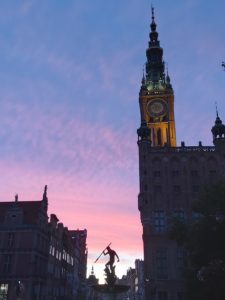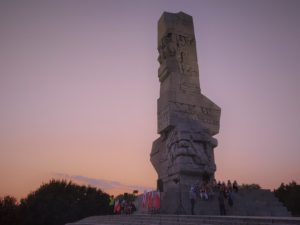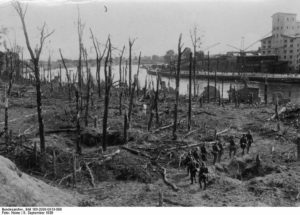
I got to Danzig almost by chance, on the last day of August 2019, while on holiday with my partner. The city, which she suggested visiting, struck me for its beauty and unusual architecture. Its Nordic buildings give it a distinctive Scandinavian vibe, whereas its bars and restaurants are teaming with life. Lost in its streets, I was completely absorbed by the summer’s colours and scents, delving into the playful atmosphere unfolding before me.
This lasted until the exploration of the city took me to the Westerplatte peninsula, which stretches into the sea to protect the city harbour. With its elbow shape, it forces the Dead Vistula, one of the Vistula’s branches, into two tight corners before allowing it to flow into the Baltic Sea.
I reached Westerplatte at sunset and followed the path surrounding it up to the sea, where the dying sun was turning the sky and the water red. Behind me, I could see the ruins of military outposts. A little further, groups of soldiers and volunteers getting ready for a parade, their movements covered by waving flags and the rumble of world war two vehicles.
This is when I discovered that Westerplatte had witnessed the very beginning of the second world war: its opening shots were fired here precisely eighty years before my visit.
Walking through the half destroyed bunkers of the peninsula, I realised that a large-scale event was being planned for the next day, on September 1st, to commemorate the beginning of the conflict. Several politicians were due intervene, including the mayor of Cassino, theatre of the bloodiest battle of the Italian campaign.
Hearing that name, I couldn’t avoid thinking about my grandpa, who had fought as a bersagliere alongside the Allies in Italy. He spent long weeks of fear on the cold mountains around Cassino, constantly surrounded by a grim landscape of death and destruction.
I remember my grandfather as a strong and discreet man, with small bright eyes. His silent presence was always reassuring to me as a kid. And I was unreservedly fascinated by him: he possessed that rare breed of physical courage that belongs only to people who are familiar with fear. We spent long summer days together and his distant war memories gave his life the feel of a grand romantic adventure. Sometimes his reserved attitude would be shaken by a passing burst of anger, which was however easy to forget: it was always a sign of fragility to me, rather than malice.

As I was strolling down Westerplatte and its peaceful wood squeezed between the Vistula and the sea, I kept thinking about him and the first clash of world war two. The local Polish garrison, roughly 200 men strong, had been instructed to resist for 12 hours in case of an attack. To do so, it could count on three progressive lines of defence: trenches, fortified outposts and finally the headquarter with its barracks. After that period of time, reinforcements were supposed to arrive from Danzig.
Nothing went according to these plans.
The nazi attack unleashed at 4.48AM on September 1st 1939, with a short naval bombardment by the Schleswig-Holstein battleship. The Germans were expecting an easy victory and thus launched their first ground assault only 8 minutes later. In the process, staff sergeant Wojciech Najsarek was cut down by machine gun fire and became, in all probability, the first victim of world war two.
Immediately afterwards however, German soldiers fell into a meticulously laid down ambush. A furious crossfire pinned them down and forced them to retreat. A second naval bombardment and ground attack ended up in the same way. Realising they had underestimated Polish defences, the Germans bombed the local garrison’s positions numerous times over the next days, from the sea and the air. The green Westerplatte wood was replaced by a wasteland of craters and torn trees. So much destruction proved however useless: further ground assaults were repelled and Polish officers jointly decided to continue fighting, despite the growing isolation of their position.
The initially planned 12 hours of resistance became entire days, whereas none of the foreseen reinforcements ever managed to relieve the surrounded soldiers.
On September 6th, everything started falling apart. By then the Wehrmacht had already reached Warsaw, the Polish garrison’s supplies were running low, its men were exhausted and the wounded, lying in bunkers without access to proper medical care, were already suffering of gangrene.
On September 7th, the Germans attacked again with renewed violence. After long bombardments in the early morning hours, they charged using flamethrowers, to force Polish soldiers out of their positions dug in the bullet-riddled ground or hidden by the bunkers’ splintered concrete. It was more than the garrison could take. At 9.45AM, a timid white flag was raised over the battlefield.

So impressed were the Germans after a week of fighting that they stood at attention and saluted the Polish survivors as they marched out to be taken prisoners. Needless to say, there is no place in war for chivalrous behaviour going beyond mere appearances. A few days later, on September 12th, sergeant Kazimierz Rasiński was murdered after a brutal interrogation for refusing to hand over the radio codes.
The bravery of Polish soldiers, who shared his struggle on the Italian battlefields, impressed my grandpa too. It was them launching the dangerous final assault to the Montecassino abbey, which ended a bloody four-month battle, he reminded me many times. And after being marked by violence, their existences are now lost in time, like those of the Italian soldiers who joined the fight against fascism after the armistice signed with the Allies on September 8th, 1943.
The sunset was dying out on Westerplatte, where the history of my family and Danzig unexpectedly met. The red light of the sun was giving way to a thin violet horizon, crowned by the white flashes of the first stars erupting in the night. As I prepared to leave and darkness brought peace to the war-torn bunkers of the peninsula, I promised myself and my grandpa to reconstruct and tell his story. To protect it from being swallowed by the past. To challenge the oblivion of death. And to find again, in the memory of my childhood, his voice and his presence.